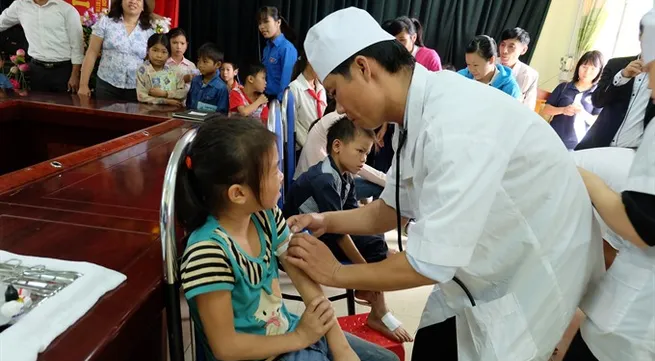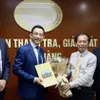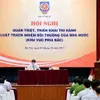Project improves people’s resilience to natural disasters


|
| A health worker provides health checkup for a student during a disaster response manoeuvre in Sơn La Province.— Photo VNRC |
HÀ NỘI — A project, entitled “Gender-sensitive community-based disaster risk management project in ethnic minority areas of North-West Việt Nam,” has helped to improve people’s resilience to natural disasters.
It has also helped in strengthening the capacity of ethnic minority groups in 12 communes and wards of northern Lai Châu and Sơn La provinces. This was told to participants at a workshop held in Hà Nội on Thursday to review outcomes of the project.
With a total budget of VNĐ39 billion (US$1.73 million), the project was implemented by the Việt Nam Red Cross, with support from the Ready Fund through the French Red Cross, the American Red Cross and French Development Agency (AFD) from April 2014 to September 2017.
The project helped to build a group of capable officials in disaster management from provincial to community levels and contributed to the community’s vulnerability reduction through mitigation constructions. The community’s awareness was strengthened through awareness-raising campaigns on disaster preparedness, with a communication toolkit specifically-designed for people of North-West Việt Nam, and gender issues were integrated in all project activities.
“There are still plenty of similarly vulnerable and low resilient locations in Việt Nam. Implementing activities together with the Việt Nam Red Cross, represents probably one of the most important factors to ensure sustainability,” said Eric Legendre, head of Delegation of the French Red Cross in Việt Nam.
“Today, the Việt Nam Red Cross has the know-how, the human resources and the tools to scale-up and replicate the same activities in other vulnerable locations of Việt Nam. They usually don’t have the funds to implement these activities,” added Legendre.
After 42 months, the project carried out 12 vulnerable and capacity or community-based disaster risk assessments. Two provincial disaster response teams, 12 community action for disaster response (CADRE) teams with 320 members have been established, trained and equipped. More than 55,000 people and 2,063 students were trained on disaster preparedness and gender equality knowledge. Some 36 disaster response manoeuvres were organised, with the participation of 2,245 people and 2,840 students and teachers. Some 48 teachers were trained on disaster preparedness and safe school measures, and 288 others have undergone first aid training.
Throughout the project development, implementation and monitoring process, gender integration was an important and constant element of all project activities. — VNS
Tags:





